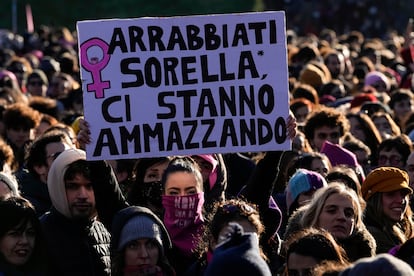The femicide case that can change Italy
The murder of a young university student by her ex-partner has led to an unusual level of awareness about violence against women. This is occurring as a dramatic comedy about female emancipation is sweeping a country that, for the first time in history, is led by a woman

The Carabinieri (the police) in the district of Vignobo, in Venice, received a call on Saturday, November 18, at 11:18 p.m., alerting them about a fight between a man and a woman, who had gotten into a car and then driven away. In the car were Giulia Cecchettin and Filippo Turetta — two university engineering students who had recently ended a romantic relationship. But neither was that a fight nor was the call simply an alert to the police.
What was happening (and this could have been discovered by law enforcement if they had taken the trouble to go to the scene instead of prioritizing other cases) was the beginning of an act of gender-based violence that ended with the girl being stabbed to death. The call, in reality, was a noisy alert to an entire country that, for decades, has turned its back on gender-based violence. Now, after witnessing this recent tragedy, Italian society may have finally woken up.
A few minutes after the first call, the police received another communication, as published by the LaPresse news agency. This was from a security guard at an industrial estate in Fossò, a few miles from the scene of the first incident. He reported that a girl had received a beating in front of the Dior warehouse he was guarding. The security cameras had recorded it and he had noticed the incident while reviewing the footage. By then, it was too late.
The next time the phone rang at the station, at 1:30 p.m. on Sunday, the police heard the voice of Gino Cecchettin — the father of the girl who was in that car. The man wanted to report the disappearance of his daughter. Unbeknownst to him (or the police) she had already been murdered at the hands of her ex. In the statement Cecchettin gave police, he explained that his daughter had left her boyfriend, but continued to see him, because he was deeply depressed. She feared that he might harm himself.
The killing of Giulia Cecchettin, 22, has moved Italy. Firstly, because of its particularities: two young people, from wealthy families, both university students. And also because of the gruesome violence: the warehouse security camera recorded the boy hitting the victim and dragging her across the floor while she screamed. “You’re hurting me,” she pleaded. After complicated search efforts, the body was located in a canal next to Lake Barcis. The autopsy revealed that she had been stabbed in the head and neck and that she tried to defend herself, because several wounds were found on her arms and hands. Finally, the attacker fled by car, as he had planned, to Germany. He eventually ran out of gas and money and was arrested.

This year, Italy has seen 87 women murdered in cases of gender-based violence. They were killed by either family members or romantic partners. Last year, there were 103 femicides. The current government — the first in Italian history to be led by a woman, far-right Prime Minister Giorgia Meloni — has cut funds to prevent sexist violence by 70%.
The case of Giulia Cecchettin crudely reveals the patriarchal culture of the country. According to the reconstruction of events provided by the victim’s friends, her ex-boyfriend asked her — hours before killing her — to slow down her academic progress and skip certain exams. He didn’t want to appear as less brilliant or talented than her. He wasn’t just humiliated by the fact that she had left him — he was also feeling intellectually inferior. She ignored him, obviously. She was supposed to have graduated last Thursday.
The case of Giulia Cecchettin has other components. It occurred on the eve of a large demonstration against sexist violence. The murder also happened at a time when two women are at the head of the government and the opposition: the far-right Meloni and the social democrat Elly Schlein. And, as journalist Concita de Gregorio points out, Giulia was killed amidst a climate of awareness influenced by the premiere of C’è ancora domani (There’s still tomorrow), a fabulous dramatic comedy about female emancipation in 1946. The film is on its way to becoming the most-viewed in Italian history (four million Italians have already seen it). Paola Cortellesi is the acclaimed star and director of the movie.
“The problem in this country is that this subject hasn’t been considered culturally relevant or important. Every time there’s a debate on this issue (gender-based violence), Parliament is deserted. It’s considered to be a ‘women’s problem.’ There’s also a very misogynistic culture in law enforcement that considers arguments to be natural in relationships. And it’s a culture that women also take part in. The issue isn’t that we need harsher penalties: this is a battle that is fought with education,” De Gregorio emphasizes.
The problem of education also leads to a national economy where 43% of women don’t have a checking account in their name. There have been protests against these conditions for a long time. The slogan that is now heard in the protests against Giulia’s death — “Let’s come out of the silence” — was often chanted in public squares during the last Berlusconi administration (2008-2011).
Italians like Assunta Sarlo started that movement. She’s a journalist and feminist activist. “I think there’s a level of awareness like never before. We’ve seen it in the squares, with the demonstrations. For once, these aren’t just women’s demonstrations — there are young men who reject [gender-based violence] too. We’ve also seen this shift in the media: finally, major voices have criticized [this phenomenon], saying that it’s a male problem,” she points out. “But all this shock and indignation contributes nothing if it doesn’t become political. Only then will we be able to see if [our agitation] has helped.”
“Education [against sexism] in school shouldn’t be a slogan. Rather, it should be a profound reform. We’ll see if there’s a change when the culture of respect takes hold. Because that patriarchal culture is still visible in young people from good families, like Giulia’s murderer.”
The Meloni administration has just approved a law to promote this educational change. It’s a first step, but all experts agree that it’s insufficient. The opposition has proposed going further and approving legislation that introduces emotional education in schools — something that parties such as Matteo Salvini’s extremist League party aren’t willing to accept, considering that it’s part of what they deem to be “gender ideology.”
In any case, for the first time, the leader of the opposition and the government have agreed to meet and talk to try to build a common front in this fight. In Italy, this alone is revolutionary.
Sign up for our weekly newsletter to get more English-language news coverage from EL PAÍS USA Edition
Tu suscripción se está usando en otro dispositivo
¿Quieres añadir otro usuario a tu suscripción?
Si continúas leyendo en este dispositivo, no se podrá leer en el otro.
FlechaTu suscripción se está usando en otro dispositivo y solo puedes acceder a EL PAÍS desde un dispositivo a la vez.
Si quieres compartir tu cuenta, cambia tu suscripción a la modalidad Premium, así podrás añadir otro usuario. Cada uno accederá con su propia cuenta de email, lo que os permitirá personalizar vuestra experiencia en EL PAÍS.
¿Tienes una suscripción de empresa? Accede aquí para contratar más cuentas.
En el caso de no saber quién está usando tu cuenta, te recomendamos cambiar tu contraseña aquí.
Si decides continuar compartiendo tu cuenta, este mensaje se mostrará en tu dispositivo y en el de la otra persona que está usando tu cuenta de forma indefinida, afectando a tu experiencia de lectura. Puedes consultar aquí los términos y condiciones de la suscripción digital.









































